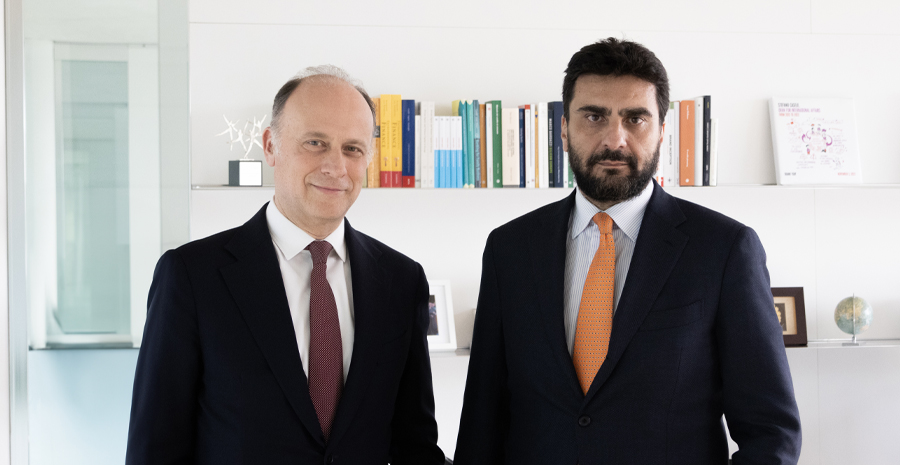
- Start date
- Duration
- Format
- Language
- 2 Dic 2025
- 4,5 days
- Class
- Italian
In the most delicate moment for transatlantic equilibrium, Milan became the center of global debate between economy and power. At SDA Bocconi, the IRG Conference 2025 (Influence, Relevance & Growth) brought together leading voices from business, finance and institutions to discuss how companies can translate knowledge and influence into sustainable growth and geopolitical competitiveness.
Organized by IRG Enhanced Intelligence in collaboration with Aspen Institute USA, Aspen Institute Italia, SDA Bocconi and with media partnership from CNBC US and Class CNBC, the conference addressed new dynamics between business, markets and policymakers in an era marked by trade wars, accelerated transitions and a growing skills deficit in policymaking.
The influence deficit
The Global 200 IRG, the first research to scientifically measure corporate "influence fitness," revealed an unequivocal picture: only 2 companies out of 200 exceed the minimum threshold of 20/30 IRG points, while the global average stops at 13.64/30. Data tracked by IRG AI across 2.1 million documents analyzed between January and September 2025 shows the most evident deficiencies in Industry Power, Media Power and Thought Leadership: the three indicators that most affect a company's ability to influence its regulatory ecosystem.
"IRG is not a new reputation index, but an operating system," stated Fernando Napolitano, CEO of IRG. “Companies operate in increasingly complex contexts where policymakers need structured knowledge transfer to make informed decisions to protect shareholder value".
Stefano Caselli, Dean of SDA Bocconi, emphasized that "any organization needs management and needs KPIs to create value," but added that "performance is not enough." The question, as Napolitano framed it: "Society has changed. What is the new role of the private sector?"
Face-to-face dialogue
The conference adopted an exclusive face-to-face format, with sessions conducted by Michelle Caruso-Cabrera (CNBC) and Andrea Cabrini (Class CNBC).
Ken Hersh, President of the George W. Bush Presidential Center, framed the American business climate in stark terms, declaring that the next three years will define the next fifty, with the US-China relationship at a pivotal moment. "All the risks are above ground. We don't have to guess where the uncertainty is," he argued. What drives growth is maintaining the framework that enables adaptation: "capital markets, rule of law, private property protection and ingenuity."
Thomas Tugendhat, former British Minister for Security, described Europe's challenge as a choice between protection and growth. Aging populations naturally protect what they have rather than pursue what they might gain, creating what he called "distance democracy": people voting by leaving. The opportunity lies in disruption. Like energy before it, AI multiplies human output. Europe can either regulate innovation into stasis or harness it for renewal. His conclusion was direct: "You only get growth when you liberate ideas."
Davide Serra, Founder of Algebris Investments, diagnosed Europe's predicament as self-inflicted. The continent thrived on a comfortable arrangement – American defense, Chinese markets, superior social benefits – until its two pillars went head-to-head. "We're now stuck in the middle," Serra observed. Yet his most provocative point wasn't about Europe's strategic bind but its squandered potential. Sixty-seven percent of Silicon Valley's technical talent is European-origin. "There's nothing wrong with Europe… we're just not smart enough to create our own leaders." The talent exists. Europe simply fails to create the conditions for it to build at home.
Alessandro Varaldo, CEO of Banca Aletti, reframed Europe's challenge from scarcity to misallocation. While economists warned of recession, Europe has €35 trillion in savings with €1.6 trillion sitting idle in Italian bank accounts alone earning below inflation. "We're not investing!" Yet Europe needs €800 billion to finance growth. The disconnect isn't about resources but structure and education. "Who is investing will win. Who is changing will win."
William E. Mayer, Chairman Emeritus of Aspen Institute, drew on decades observing market disruptions to offer perspective on adaptation. Geopolitical shocks – whether 2008's financial crisis or Ukraine's invasion – follow a pattern: panic, overreaction, then stabilization into what he called "a new normal." The question isn't whether disruption happens but how different actors respond to it. "There's always opportunity. Some people have a better ability to cope and others seem frozen. That applies to countries too." His advice to the next generation of leaders: "Inflection points will happen your entire life. Just get used to change."
William Browder, Founder of Hermitage Capital Management, brought an investor's perspective to conflict economics. Since the war began, China, India and Turkey paid Russia $400 billion for oil. "The sanctions are penalizing. Don't believe they're not," Browder argued, "but there's a giant loophole." Geopolitical conflicts, like business problems, respond to incentive structures. His broader point: follow the money, understand the incentives, and you understand how systems perpetuate themselves. The tools to change outcomes exist. What's missing is the will to use them.
A new standard
The IRG Conference 2025 established what Caselli called "a new standard for global management", one that measures influence as rigorously as financial performance. The diagnosis was unanimous: Europe holds the capital, the talent and the technical capability. What it lacks is the framework to deploy them and the will to liberate ideas.
In a context where policymakers lack technical expertise and companies struggle to translate knowledge into policy impact, the event became a laboratory for new global governance, in which influence, relevance and growth return as keywords for the future of business and democracies.
SDA Bocconi School of Management



The program equips you with tools to identify your team's strengths and challenges, adapting your leadership style to enhance team effectiveness.

